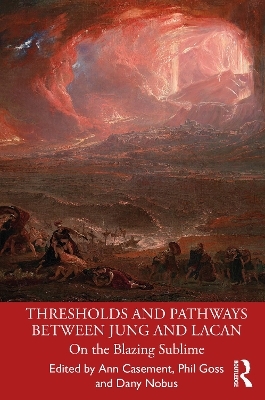
Thresholds and Pathways Between Jung and Lacan
Routledge (Verlag)
978-0-367-54543-7 (ISBN)
This groundbreaking book was seeded by the first-ever joint Jung–Lacan conference on the notion of the sublime held at Cambridge, England, against the backdrop of the 100th anniversary of the outbreak of the Great War. It provides a fascinating range of in-depth psychological perspectives on aspects of creativity and destruction inherent in the monstrous, awe-inspiring sublime.
The chapters include some of the outcrop of academic and clinical papers given at this conference, with the addition of new contributions that explore similarities and differences between Jungian and Lacanian thinking on key topics such as language and linguistics, literature, religion, self and subject, science, mathematics and philosophy.
The overall objective of this vitalizing volume is the development and dissemination of new ideas that will be of interest to practising psychoanalysts, psychotherapists and academics in the field, as well as to all those who are captivated by the still-revolutionary thinking of Jung and Lacan.
Ann Casement LP is a Professor at the Oriental Academy for Analytical Psychology, China; a member of the International Association for Analytical Psychology, where she served on its Executive and Ethics Committees; and a senior member of the BJAA. She lectures worldwide and has published extensively, including Who Owns Psychoanalysis, which was nominated for the Gradiva Award in 2005, and contributes to The Economist and international psychoanalytical journals. Phil Goss is Associate Professor and Director of Counselling and Psychotherapy at Warwick University, UK. He is the author of Jung: A Complete Introduction (2015) and Men, Women and Relationships: A Post-Jungian Approach (2010) and has published on a range of topics from a Jungian perspective, including education and learning difficulties, gender and spirituality. Dany Nobus is Professor of Psychoanalytic Psychology at Brunel University London, UK, Founding Scholar of the British Psychoanalytic Council, and Former Chair and Fellow of the Freud Museum London. He is the author of numerous books and papers on the history, theory and practice of psychoanalysis, most recently The Law of Desire: On Lacan’s ‘Kant with Sade’ (2017).
Introduction
Section One: Theory
1| Simply Sublime? Lacan, Jung, and the Red Book
Paul Bishop
2| Sublime Anxiety
Bernard Burgoyne
3| The Complex Pleasure of the Sublime
Ann Casement
4 | Jung, the Sublime and Apophatic Mysticism in Psyche and Art
John Dourley
5| The Subjective Sublime: Like a Diamond?
Phil Goss
6 | The Blazing Sublime: Opportunity for the Integration of Otherness
Nami Lee
7 | The Hermetic Subtle Body and the Sublime in Jung and Lacan
Albert Morell
8 | Lacan’s Clinical Artistry: On Sublimation, Sublation and the Sublime
Dany Nobus
9 | A Crumpled Note or Purloined Letter? Sublime and Feminine Creativity in Destruction—Jung and Lacan
Susan Rowland
Section Two: Culture
10 | The Object of Victor Frankenstein’s Desire
Lionel Bailly 11 | The Soviet Antigones: The Poets versus the State
Helena Bassil-Morozow
12 | Thunder, Perfect Mind: Entering the Land of the Sublime
Isabelle De Armond
13 | Unconscious Processes, Instrumental Music and the Experience of the Sublime: An Exploration through Messiaen's Quartet for the End of Time
Giorgio Giaccardi
14 | The Sinthome and the Work of Imre Kertész
Sharon Green
15 | Expressing the Inexpressible: Art as a Challenge to its Own Object
Nihan Kaya 16 | The ‘Nibelungenlied’: A Germanic Myth and the Sublime
Arthur Neisser
17 | James Joyce’s ‘The Dead’ and Paleo-Postmodernism: A Lacanian-Jungian Reading
Catriona Ryan
18 | Apostolic Actuality: David Jones and Sublimation
Luke Thurston
| Erscheinungsdatum | 13.10.2020 |
|---|---|
| Zusatzinfo | 8 Line drawings, black and white; 3 Halftones, black and white; 11 Illustrations, black and white |
| Verlagsort | London |
| Sprache | englisch |
| Maße | 156 x 234 mm |
| Gewicht | 421 g |
| Themenwelt | Geisteswissenschaften ► Psychologie ► Psychoanalyse / Tiefenpsychologie |
| ISBN-10 | 0-367-54543-8 / 0367545438 |
| ISBN-13 | 978-0-367-54543-7 / 9780367545437 |
| Zustand | Neuware |
| Informationen gemäß Produktsicherheitsverordnung (GPSR) | |
| Haben Sie eine Frage zum Produkt? |
aus dem Bereich


